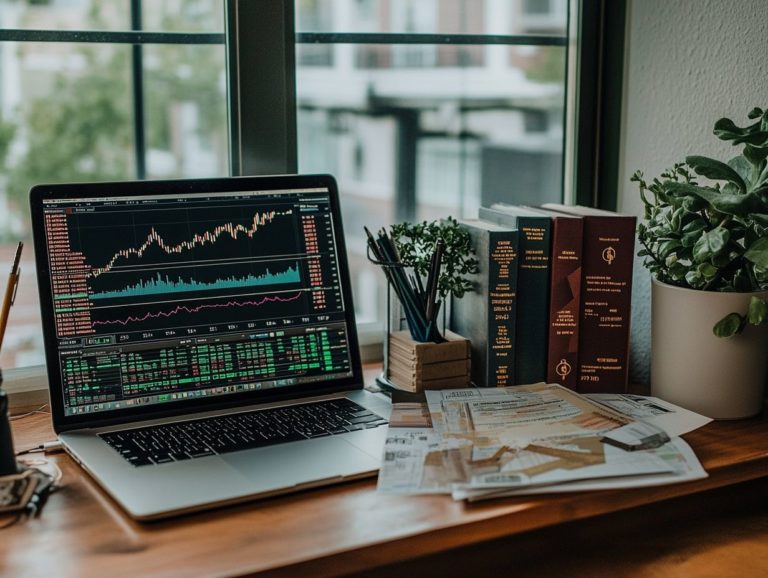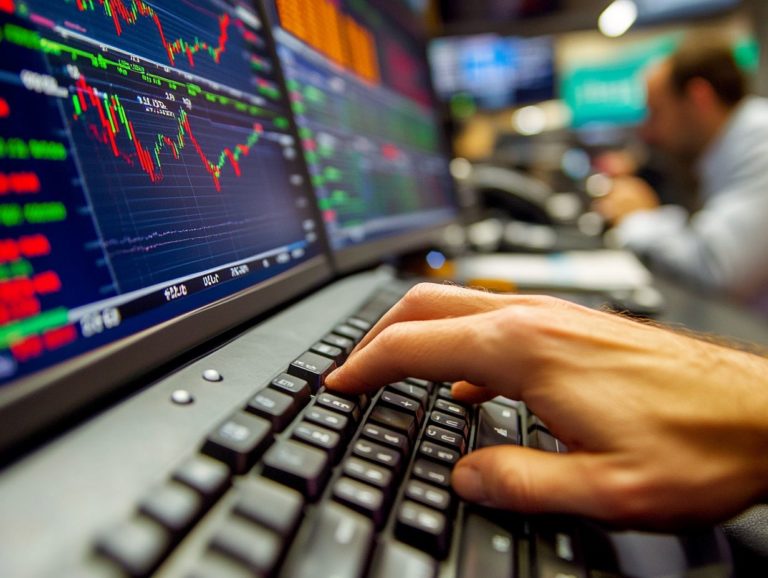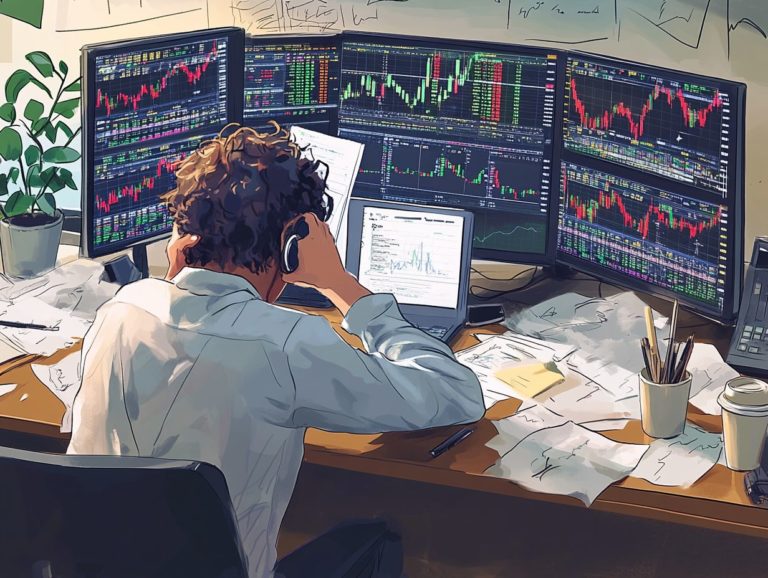The Impact of Stress on Trading Performance
Stress is an inescapable companion in the world of trading. Its impact can significantly sway your decision-making and overall performance.
This exploration delves into the intricate relationship between stress and trading. It sheds light on how both psychological and physical effects can influence your success as a trader.
We will pinpoint common stress triggers, offer effective coping strategies, and underscore the vital role of self-care in achieving a harmonious work-life balance.
By grasping and managing stress, you can elevate your performance and navigate the markets with enhanced confidence.
Contents
- Key Takeaways:
- The Connection Between Stress and Trading Performance
- The Effects of Stress on Traders
- Identifying Stress Triggers in Trading
- Managing Stress for Better Performance
- The Importance of Self-Care in Trading
- Frequently Asked Questions
- What is the impact of stress on trading performance?
- How does stress affect decision-making in trading?
- What are the consequences of stress on risk management in trading?
- How does stress impact emotional control in trading?
- What are some physical symptoms of stress that can impact trading performance?
- Can stress be managed to improve trading performance?
Key Takeaways:
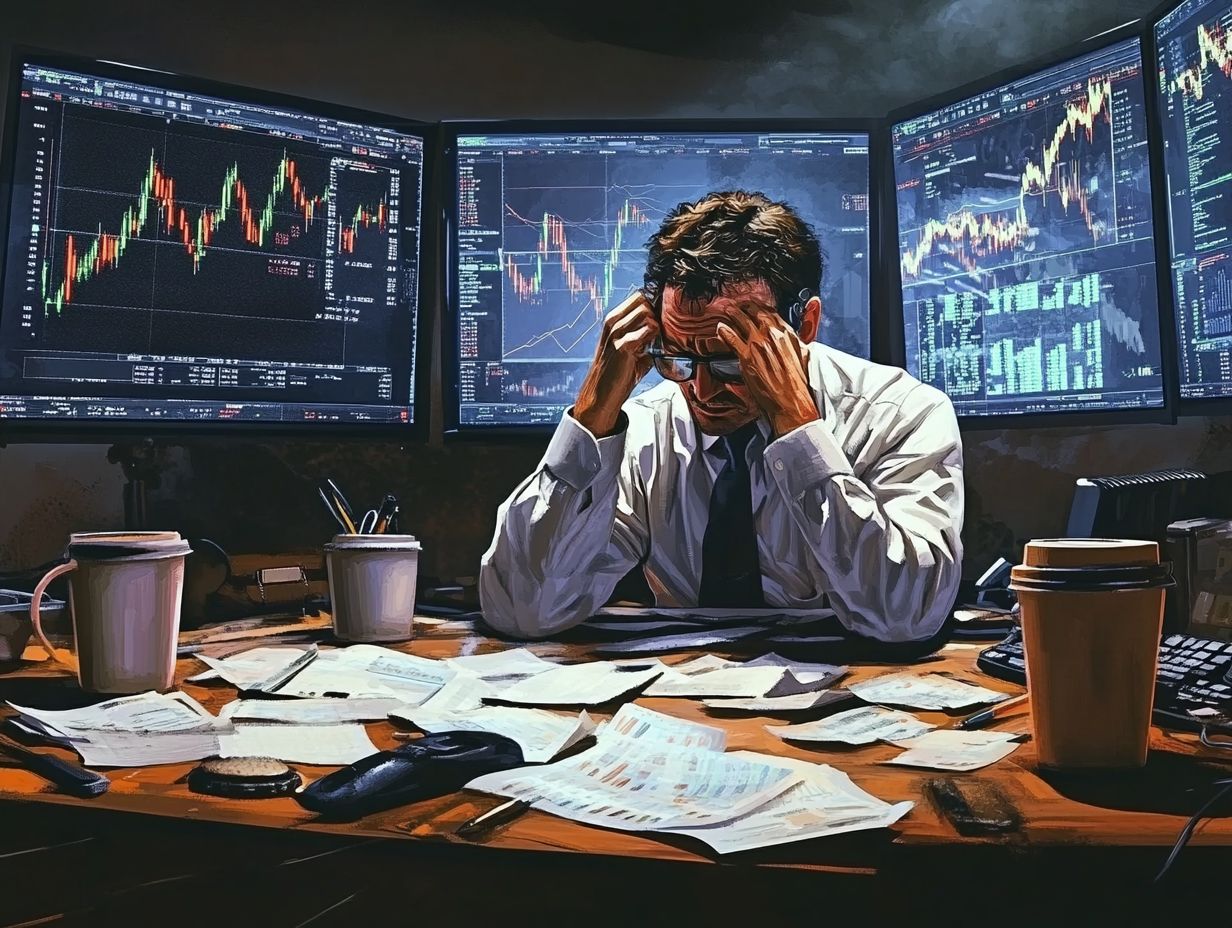
- Stress significantly impacts trading performance.
- Identify stress triggers to manage their effects.
- Self-care and stress management strategies improve performance.
The Connection Between Stress and Trading Performance
Understanding the relationship between stress and trading performance is vital for anyone navigating the high-pressure environment of trading.
Stress, often intensified by market volatility (sudden changes in market prices) and significant financial stakes, can profoundly affect your decision-making and thinking skills. In moments of heightened stress, your psychological responses may lead to emotional fatigue, hindering your ability to implement effective trading strategies.
It s crucial to understand how stress hormones like cortisol (a hormone released during stress) influence your behavior. This knowledge can be instrumental in optimizing your performance and enhancing your well-being in the ever-evolving landscape of financial markets.
How Stress Affects Your Trading Decisions
Recognizing how stress impacts your thinking skills and emotional responses is essential. Factors like high financial stakes and market fluctuations can significantly heighten stress levels, leading to adverse effects on your trading psychology.
Stressors can cloud your judgment, impair critical thinking, and drive impulsive decisions. This often results in poor trades or missed opportunities. When you experience heightened anxiety, your ability to process information may be compromised, diminishing your situational awareness.
Grasping the intricate dynamics between stress and emotional stability is essential. These elements can dictate your effectiveness in the fast-paced trading environment. By actively managing stress, you can enhance your cognitive clarity and achieve more consistent performance in trading.
The Effects of Stress on Traders
Stress profoundly impacts traders, affecting both their psychological and physical well-being. Understanding the psychological effects of trading frequency can help address these issues, ultimately improving their performance and decision-making capabilities.
The psychological toll can manifest as anxiety disorders, emotional exhaustion, and even analysis paralysis. All of these hinder your ability to adeptly navigate the unpredictable terrain of financial markets.
Physical fatigue, frequently a byproduct of extended stress, exacerbates these challenges. This further erodes your mental health and undermines your confidence on the trading floor.
Don t let stress control your trading success! Start implementing these strategies today to boost your trading performance.
Psychological and Physical Impacts
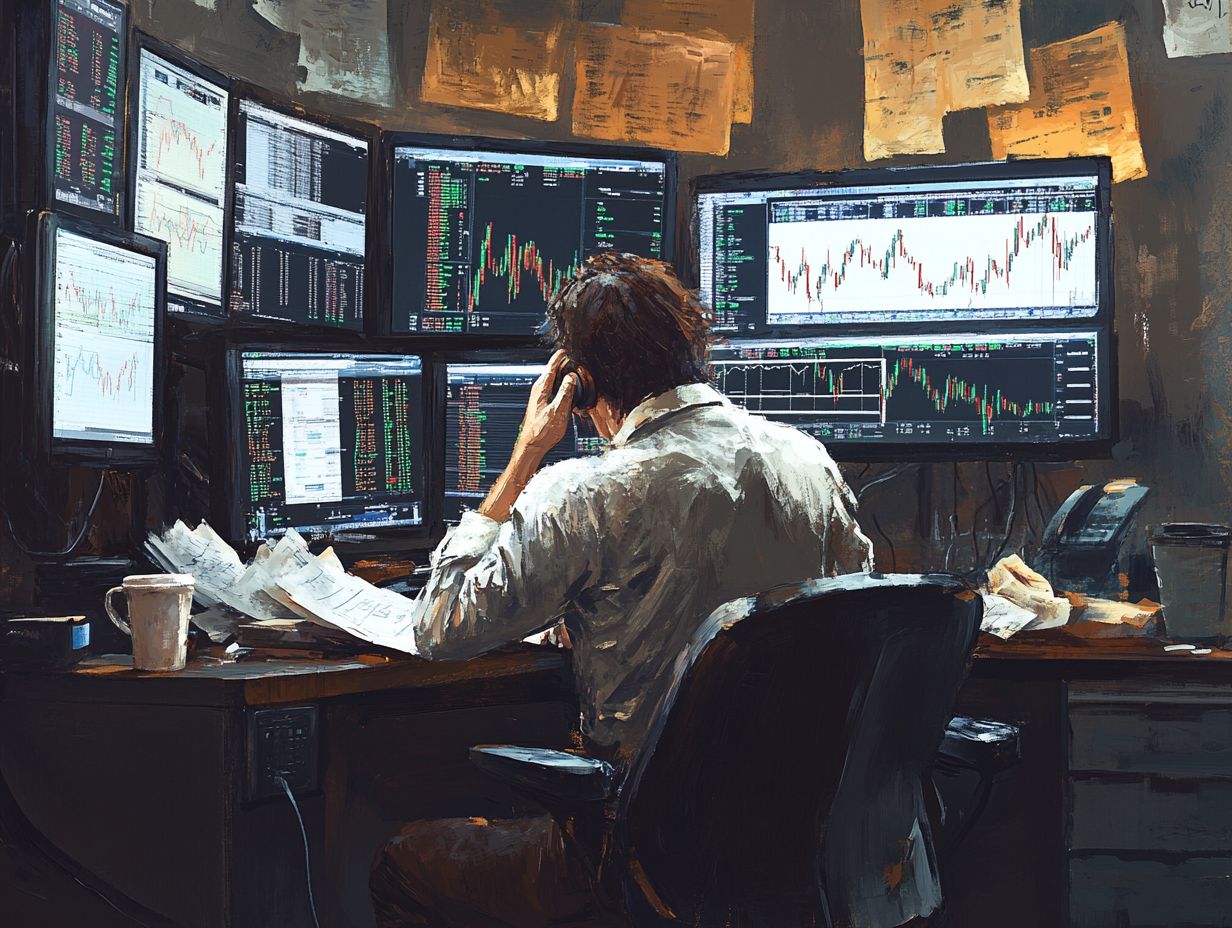
The psychological and physical impacts of stress are profound for you as a trader. They significantly influence both your mental health and trading performance. Continuous stressors in the trading environment can lead to feeling overwhelmed. Physical fatigue may impair your cognitive function, ultimately affecting your decision-making processes.
You often find yourself caught in a relentless cycle of anxiety and pressure. This can distort your perception of market opportunities. As stress levels rise, maintaining focus and emotional stability becomes increasingly challenging. This creates a harmful feedback loop that may drive you toward impulsive trades or overly cautious behavior.
As you grapple with heightened stress, the risk of emotional decision-making intensifies. This often results in losses that only amplify feelings of frustration and inadequacy. Recognizing how these stressors manifest highlights the necessity for effective coping strategies and underscores the importance of mental resilience in achieving trading success.
Identifying Stress Triggers in Trading
Identifying stress triggers in your trading environment is essential for enhancing your performance and overall well-being. Various factors can significantly impact your emotional state and decision-making process.
Market fluctuations, financial stakes, and trading losses act as primary stressors. They lead to increased anxiety and a tendency to avoid risks. Understanding your demographic as a trader is vital. Recognizing how different individuals respond to these stress triggers allows you to develop more effective risk management strategies. These are the strategies used to minimize potential losses.
Common Sources of Stress in Trading
Common sources of stress in trading are often rooted in market fluctuations, financial stakes, and trading losses. Each can significantly influence your emotional state and overall performance. Recognizing these stressors is crucial for implementing effective risk management strategies that can help mitigate their detrimental effects.
Market fluctuations can introduce unpredictability that breeds anxiety. This makes it challenging for you to adhere to your strategies. The financial stakes involved amplify this pressure; the fear of losing your hard-earned money can cloud your judgment, leading to impulsive decisions that you might later regret. Trading losses can weigh heavily on your emotions, giving rise to self-doubt and frustration, creating a negative feedback loop that is hard to escape.
This cycle impacts your current decision-making. It can also contribute to long-term mental fatigue. Acknowledging and addressing these emotional challenges is vital as you navigate your trading journey.
Managing Stress for Better Performance
Mastering stress can transform your trading game. It’s crucial for you as a trader aiming to elevate your performance and confidently navigate the intricacies of the trading environment.
By adopting a range of coping strategies tailored to your unique trader psychology, you can significantly lessen the detrimental effects that stress may impose on your trading strategies and decision-making.
Whether you explore stress management techniques or ergonomic enhancements in your workspace, grasping the fundamental psychological and biological responses to stress will enable you to maintain control and elevate your trading career.
Don’t let stress dictate your trading fate! Take control now!
Strategies for Coping with Stress

Implementing effective coping strategies for managing stress is essential for your success as a trader. It helps maintain emotional equilibrium and enhances your performance. Techniques such as mindfulness, structured decision-making, and regular feedback can significantly mitigate emotional reactions and improve your overall psychology.
By embracing mindfulness, you can cultivate a heightened awareness of your thoughts and feelings. This awareness allows you to respond to market fluctuations with greater clarity, steering clear of impulsive reactions.
Structured decision-making is another powerful tool. By creating a systematic approach to your trades, you minimize erratic choices and instill a sense of control amidst the chaos.
Seeking regular feedback from peers or mentors provides invaluable insights and reinforces positive behaviors. This paves the way for continuous improvement.
These strategies not only alleviate stress but also foster resilience. Ultimately, they enhance your trading performance and decision-making over the long term.
The Importance of Self-Care in Trading
Self-care in trading is essential for sustaining mental health and overall well-being in the high-pressure environment of the trading floor.
Striking a healthy work-life balance is vital to alleviating physical fatigue and emotional rollercoasters that often arise in a trading career. By prioritizing self-care, you can foster resilience, enabling you to handle market fluctuations with enhanced emotional stability and sharper decision-making.
Creating a Healthy Work-Life Balance
Creating a healthy work-life balance is essential for you as a trader. It helps foster self-care that promotes your mental health and emotional well-being. By setting boundaries and prioritizing personal time, you can reduce stress levels and enhance your performance in the demanding world of trading.
Incorporating strategies like establishing a fixed trading schedule, utilizing time-blocking techniques, and integrating regular breaks can significantly help you achieve this balance.
Engaging in physical activities or mindfulness exercises during breaks will refresh your mind. Setting realistic trading goals can also prevent feelings of overwhelm.
Seeking social connections and support from fellow traders or mentors fosters a sense of community. This helps mitigate feelings of isolation that often arise in this competitive field.
Together, these approaches cultivate resilience and enhance not just your trading success, but also your overall quality of life.
Frequently Asked Questions
What is the impact of stress on trading performance?
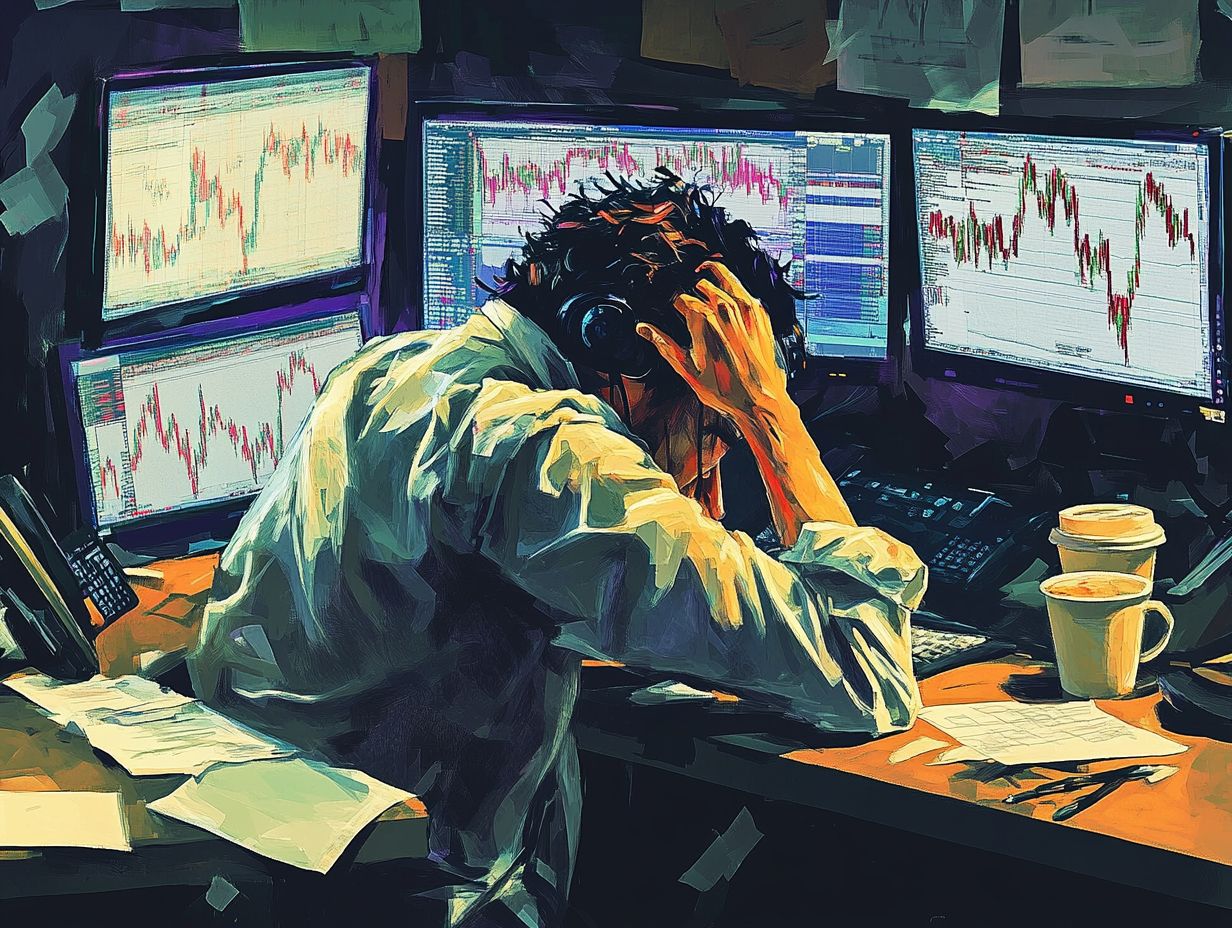
Stress has a significant impact on trading performance. It can affect a trader’s decision-making ability, risk management, and emotional control, highlighting the importance of understanding the psychological impact of trading frequencies.
How does stress affect decision-making in trading?
Stress can impair cognitive function, leading to poor decision-making and impulsive actions in trading. This results in losses and missed opportunities.
What are the consequences of stress on risk management in trading?
Stress can cause traders to deviate from their risk management strategies. This leads to higher risk-taking and potential losses. It can also result in overtrading in an attempt to recover losses.
How does stress impact emotional control in trading?
Stress can trigger emotional responses such as fear, anxiety, and greed. These emotions can cloud a trader’s judgment, leading to irrational decisions and impulsive behaviors.
What are some physical symptoms of stress that can impact trading performance?
Physical symptoms of stress, such as muscle tension, headaches, and fatigue, can affect a trader’s focus, alertness, and overall performance in trading.
Can stress be managed to improve trading performance?
Yes, stress can be managed through various techniques such as relaxation exercises, proper time management, and seeking support from peers or professionals. This can help improve a trader’s mental and emotional well-being, leading to better trading performance.
Have more questions? Don t hesitate to reach out for support and resources!



